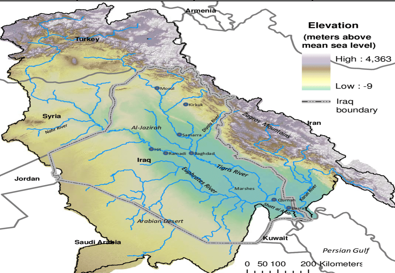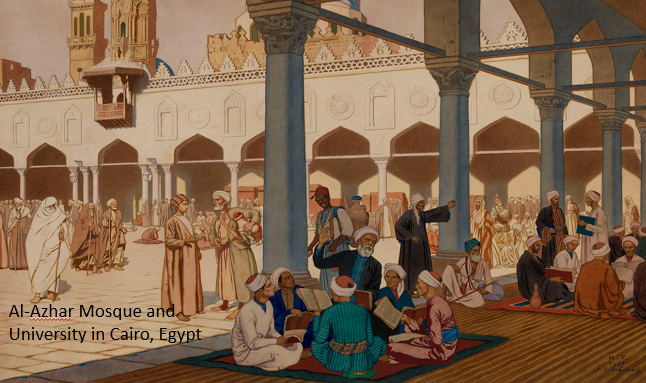Concept of School: The word, ‘school’ as a concept came into being in the early period of human settlement at one place to teach their children about knowledge related to their past, culture, and other social values. In this article, we have discussed the “Concept of School” in detail, including the meaning of school, the history of the school, the Gurukul Vedic School in India, early Schools in Mesopotamia, Islamic Civilization, and 10 oldest schools of the world and many questions related to the concept of school, and more.
Table of Contents

Concept of School: Meaning of School
The meaning of school in child life has its origin in prehistory and early civilization. Why was school established? When was the need of school first realised? All these things can have their connection to early age people when they lived in groups together and realised the role of school in child education. Let’s know first the meaning of the word “school”.
Meaning of Word School
The word “school” is derived from the different etymological sources like:
The middle English word, “scole”,
The old English word, “scōl”,
The Latin word,“schola”, and from
The Greek word,“scholē”.
Thus, the word school derives from Greek “σχολή (scholē)”, originally it means “leisure” and also “that in which leisure is employed“. But later on it means “a group to whom lectures were given”.
“School is a place or institution for teaching and learning process to educate children and make them learn the truth of life, society, and mankind”. Dr. Md. Usmangani Ansari
Let’s begin with the difference between “concept school” and “concept of school”.
Difference between Concept School and Concept of School
Here we will discuss the different concepts of school. The concept of school came into the minds of elders in pre-history to fulfill the need to educate their children about their past and present culture, way of life, etiquette, and social values and prepare them to face life issues. Whereas the concept school is a non-traditional school of learning. It teaches students different values of society, and academic subjects, and prepares them for India’s prestigious colleges and institutes.
The concept school in India has its own non-traditional teaching and learning academic mechanism of curriculum. It is mainly based on ethics and transformative values with critical thinking process to any academic problems generally asked in competitive entrance exams of NEET, JEE, NTA, NDA, IAR, etc.

The Concept School (TCS) in Pennsylvania, USA is a co-educational independent private school for students grades 6 -12. It prepares students to meet the demands of post-secondary life, whether entering college, career training programs, or the workforce.
Concept of School: Why was school created?
The concept of school and education has its roots dating back to the very first humans ever to inhabit the Earth. However, the forms, mode, nature, and concept of school were different then as compared to modern school. The earliest people (hominids) dwelling in forests or in mountain’s caves as a family didn’t feel the need of schools to pass the information they had to their younger generation. They used to educate them individually within the family.
They felt how to preserve their culture and norms they lived with. It led every generation then to find it necessary to pass on their accumulated knowledge, values, traditions, culture, and skills to subsequent generations. However, over a period of time when people settled at the bank of rivers and started farming as a result their population grew and society originated. It led them to think of a formal school to pass on their knowledge to the younger generation.
Thus, the formation of society led to the concept of school for the first time conceived in the mind of elders members of a group in the early period of civilization. They felt that instead of every family being individually responsible for education, it would be convenient, efficient, and more practical to assign this duty to a small group of adults to teach a larger group of children at a single place. Thus, the concept of the school was born when society came into existence.
Read related article: Meaning, Definition and Role of Education in Child Career and Life
Concept of School History
The concept of school in child education and learning begins with its history of school in different civilizations, countries, and regions in different ways and forms. There is evidence of early education through the school-like system in Egypt and the Middle East around 3500 BC and in China from 1200 BC. The evidence of school in some forms is also found in other parts of the world including Greece, Rome, and the Indian subcontinent. For example, in India the school started with Vedic Gurukul system of teaching and learning.
Gurukul Concept of School in Indian Vedic Period
The system of school in India came into being in Vedic period with the introduction of Gurukul as school in the house of Guru. The Gurukul concept of school system was a residential form of schooling in around 5000 BC of Vedic age of the Indian subcontinent. It was the home of Guru or Acharya i.e. teacher where pupils or shishya (students) resided till they completed their education. They lived there in natural surroundings with each other with brotherhood, love, discipline, and humanity.

Gurukul’s pupils (students) were taught about subjects like language, science (vigyan), mathematics (gadit) including arts, crafts, sports. The Gurukul’s methods of teaching were group discussion, conversation with teachers, self-learning, etc. They were also taught about yoga, meditation, mantra chanting, etc. for fitness, positivity, and peace of mind. The main objective of Gurukul education was to develop students’ personality, make them confident, intellectual to face society and the world. As a result people were believed to be incomplete without the role and concept of school in child education and life.
Concept of School in Mesopotamia (Modern Iraq)
Before knowing the role and concept of school in child education and its history, let’s first know about Mesopotamia. The ancient civilization of Mesopotamia is called modern Iraq. Mesopotamia is a Greek word that means the land between two rivers, Tigris and Euphrates. The civilization of Mesopotamia flourished between the two fertile rivers around 5000 BC. The region is now home to modern Iraq, Kuwait, Turkey, and Syria, and parts of western Iran. Thus, the history and concept of school in Mesopotamia is the story of school in modern Iraq, Kuwait, Turkey, Syria, and western parts of Iran.

Massive texts are recovered from the archaeological contexts of Old Babylonian scribal schools called edubas (2000–1600 BC). Babylon was the capital of Babylonia in southern Mesopotamia, about 60 miles south of modern Baghdad (capital of Iraq). In the scribal concept of school in Mesopotamia only royal offspring, particularly sons of the rich and professionals such as scribes (members of a learned class), physicians, and temple administrators, were taught. Boys were generally taught their father’s trade. But girls stayed at home and learned housekeeping, cooking, and to look after the younger children.
Later in Babylonian period there were libraries in most of the town and temples in addition to the concept of school systems for reading purposes. At this time both women and men learned to read and write, and vocabularies, grammars, and interlinear translations were compiled for the use of students in schools. Thus, the need of school in child education, career, and life was also given importance then.
Concept of School in Islamic Civilization
The concept of school in Islamic civilization spread between China and Spain during the 7th to 9th centuries. The Islamic concept of teaching and learning started from 622 AD in Medina first at mosques (masjid). It was the year of the Prophet Muhammad hijrah (migration). Medina is a city in Saudi Arabia where the Prophet Muhammad migrated from Mecca and completed his hijrah on September 24, 622 AD. After some time schools were separated and established next to mosques. The first separate school of Islamic world was the Nizamiyah school built in 1066 AD in Baghdad and known for the teaching in child education, career, and life.

Children were taught about the teachings of the Quran from the age of 6 year with free tuition. The most important 5 teachings of the Quran are for the well being of human civilization.
- Encouraging meditation and thinking (Everyone to use their reasoning, conscience, and think about the world around themselves and take control of their own issues.)
- Not to blindly follow every prevailing idea (The thing is not to take every existing social or religious viewpoint as granted but to use one’s own conscience to understand religion better [Quran, 9: 34])
- Promoting social equality and justice (Maintaining social fairness and impartiality in all matters no matter what cost one has to bear for it.)
- Accompanying Islamic belief with action (Achieving the true sense of the Islamic convictions like patience, moderation, thankfulness, and manners etc.)
- Anyone can attain the path of true righteousness (Quran does not discriminate among the appreciators and achievers of goodness).
Also Read: UPSC Full Form & Exams it Conducts
10 Oldest Schools of the World: History of Schools
Here is a list of some schools of the world which exist even today. The list is based on well researched educational history but can’t be claimed of their age and oldest schools in order. In this list, all these oldest schools are located in Europe, mainly England except No. 1 which is in China. These schools are even today in operation and considered one of the best schools for child education, career, and life in the region.
Oldest Schools in World
SN | School | Foundation | Country | Type | Gender |
1. | Shishi High School* | 143–141 BC | China (Chengdu) | Public | Mexed (Coed) |
2. | The King’s School Canterbury | 597 AD | Canterbury, England | Private | Mexed (Coed) |
3. | King’s Rochester | 604 AD | Rochester, England | Private | Mexed (Coed) |
4. | St Peter’s School | 627 AD | York, England | Private | Mexed (Coed) |
5. | Thetford Grammar School | 631 AD | Thetford, England | Private | Mexed (Coed) |
6. | Royal Grammar School Worcester | 685 AD | Worcester, England | Private | Mexed (Coed) |
7. | Beverley Grammar School | 700 AD | Beverley, England | Public | Boys |
8. | Sherborne School | 705 AD | Sherborne, England | Private | Boys |
9. | Gymnasium Paulinum | 797 AD | Munster, Germany | Public | Mexed (Coed) |
10. | Gymnasium Carolinum | 804 AD | Osnabruck, Germany | Public | Mexed (Coed) |
*Note: Shishi High School is a state secondary public school in Chengdu, China. It is considered as the oldest school of world. The original Shishi school was built by the Han dynasty governor Wen Weng in 143–141 BC as the first public school. It was constructed by using stones as Shishi means stone chamber. It is also known as “Wen Weng Shishi” or the “Stone Chamber of Wen Weng”.

The name changed many times when new dynasties came after old ones. As Chengdu Fuxue in 1661, Jinjiang Academy in 1740, Chengdu Normal School under new educational system in 1902, Chengdu Middle School in 1904. It was renamed Chengdu Shishi Middle School in 1940 and Chengdu No.4 Middle School in 1952 under the People’s Republic of China and finally it returned to its former name in April 1983. Thus, the history of the oldest school in China went through many changes when the dynasty changed.
Direct link to Right to Education to understand the concept of school in India: here
Importance of School in Life
Why does school matter so much in the life of a child? There are different reasons why school is important in life. Let’s know the importance of school in life of every child as given below:
- Children learn social norms at school.
- School makes a child learn discipline in life.
- It makes youngsters confident in life.
- School encourages children for critical thinking.
- School introduces young children to their future goals.
- School provides students a variety of life opportunities.
- School teaches the students about the importance of the learning process.
- School makes the students aware about their career.
- School reduces social poverty by educating children how to earn for self and family.
- School benefits children, family, community, and the whole country.
FAQs Related to Concept of School
Q. What is the basic concept of schools?
Ans. The basic concept of schools is to provide structured environments for learning and education. Schools serve as institutions where students receive formal instruction, guidance, and support to acquire knowledge, develop skills, and prepare for future endeavors.
Q. What is the concept of school?
Ans. The concept of school is closely related to the involvement of voice and shared leadership with more individuals and diverse viewpoints in the governance of school for teaching children about academics, social norms and values, etc.
Q. When did the concept of school start in the USA?
Ans. The concept of school started on April 23, 1635 with the establishment of the first public school in Boston, Massachusetts (USA).
Q. Who invented the concept of school in the USA?
Ans. Horace Mann is said to be the inventor of the concept of school in the USA. He is considered as the pioneer in bringing educational reforms into society there.
Q. What is the purpose of schools?
Ans. The concept of school and its purpose is to prepare children so that they can identify and understand themselves to learn the lesson of life for living morally, creatively, and productively in a democratic society.
Q. What is meant by concept school?
Ans. Concept Schools provide students an individually-focused learning plan and curriculum to prepare them towards graduation and acceptance into colleges and universities of higher learning.
Q. What is the concept teacher?
Ans. The concept teacher uses the teaching process for understanding specific concepts, the nature of concepts, and the development of logical reasoning & critical thinking to solve any problems.
Q. What is a school?
Ans. A school is an institution designed for the purpose of providing education to students. It is a place where teachers and students come together to engage in learning and teaching activities.
Q. What is the purpose of a school?
Ans. The primary purpose of a school is to facilitate learning and education. Schools aim to provide students with knowledge, skills, and competencies to help them develop intellectually, socially, emotionally, and physically.
Q. What are the different levels of schooling?
Ans. Schooling typically consists of different levels, including preschool or nursery school, primary or elementary school, secondary school, and higher education institutions like colleges and universities.
Q. What is the role of teachers in a school?
Ans. Teachers play a crucial role in schools. They are responsible for planning and delivering lessons, assessing student progress, providing guidance and support, and creating a conducive learning environment. They act as mentors and role models for students.
Q. What subjects are taught in schools?
Ans. Schools generally offer a wide range of subjects to provide students with a well-rounded education. Common subjects include mathematics, science, language arts (such as reading, writing, and literature), social studies, physical education, arts, and foreign languages.
Q. How are schools structured?
Ans. Schools can be organized in various ways depending on the education system and country. They may have different grade levels, classrooms for each grade, specialized rooms for specific subjects, administrative offices, libraries, laboratories, sports facilities, and other amenities.
Q. How are students assessed in schools?
Ans. Students are typically assessed through various methods such as tests, quizzes, projects, presentations, and assignments. Assessments help teachers evaluate student understanding, progress, and achievement in different subjects.
Q. What are extracurricular activities in schools?
Ans. Extracurricular activities are activities that take place outside of the regular academic curriculum. These activities can include sports, clubs, music, art, drama, debate, and community service. They provide students with opportunities for personal growth, skill development, and social interaction.
Q. How do schools promote student safety?
Ans. Schools prioritize student safety by implementing measures such as security protocols, emergency drills, supervision, anti-bullying policies, and creating a positive and inclusive learning environment. Schools also often have counselors or support staff to assist students with emotional well-being and address any concerns.
Q. How are schools adapting to technology?
Ans. Many schools are integrating technology into their teaching methods and infrastructure. This can include using computers, tablets, or interactive whiteboards in classrooms, providing online resources and educational software, and using technology for administrative purposes like attendance tracking and communication with parents.
These FAQs provide a general overview of the concept of school. However, it’s important to note that school systems can vary across different countries and regions, so specific details and practices may differ.
Q. What is the significance of schools in India?
Ans. Schools in India play a pivotal role in shaping individuals by providing formal education, imparting values, and fostering holistic development, preparing students for future challenges.
Q. How diverse are schools in India?
Ans. India boasts a diverse educational landscape, encompassing schools that vary in curriculum, language of instruction, and cultural influences, reflecting the nation’s rich multicultural tapestry.
Q. How has the concept of schools evolved in India over the years?
Ans. The concept of schools in India has evolved, adapting to changing educational philosophies, technological advancements, and societal needs, aiming to provide a well-rounded education for students.


This Post Has 4 Comments
Thiis post provides cloear idea in favor of the
new users off blogging, that truly how to do running a blog. https://ukrain-forum.biz.ua/
This post provides clear idea in favor of the new users
of blogging, that truly how too do running a blog. https://ukrain-forum.biz.ua/
I aam extremmely impressed with your writing skills and also
with the layout on your weblog. Is this a paid theme or did you modify it yourself?Eifher way keep
up the excellent quality writing, it is rare to see a nice blog like this one nowadays. https://ukrain-forum.biz.ua/
I am extremely impressed woth your writing skills and also with the
layout on your weblog. Is this a paid theeme or did you modify it yourself?
Either way keep up the excellent quality writing, it is rare to see a nice
blolg like this one nowadays. https://ukrain-forum.biz.ua/